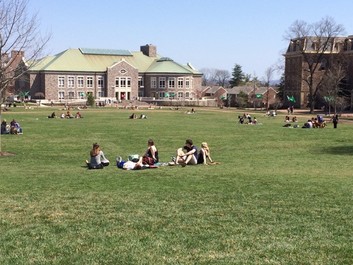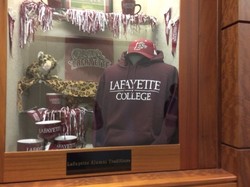
Academic Overview
For what’s been historically known primarily as a liberal arts college, Lafayette has a lot to appeal to students of nearly every persuasion. The college offers over fifty majors across four academic divisions: humanities, social sciences, natural sciences, and engineering.
Given Lafayette’s broad academic offerings and in keeping with their “why not?” motto, many students choose to pursue unconventional double majors like art and biology. Interdisciplinary study is encouraged by the faculty. With an impressive 11 to 1 student/faculty ratio, most students find professors to be extremely accessible and supportive.
Hands-on learning is a major point of pride for the Lafayette community. The college has the highest rate in the country of students working with faculty on research or academic work, and work-study programs are common. And because it is a college, not a university, undergraduates are not competing for research opportunities with graduate students. Many classes have a student instructor in addition to a professor, giving students the opportunity to teach and learn with one another in a way many schools don’t offer.
If you’re looking for a school that will let you think creatively, work hand-on, and push boundaries, Lafayette College might be a perfect fit for you.

Lafayette has approximately 2,450 students, with 53% male and 47% female. Housing is guaranteed for all four years. Freshmen are assigned to one of five teams, called Commons, both for orientation and housing purposes as well as for academic and social activities. Over 70 residential facilities run the gamut from residential halls, suites, and group living units such as specialty houses and Greek life.
There’s a tremendous sense of community and connectedness between undergraduates. This is reflected in their over 250 student organizations and clubs, including honor societies, cultural and political organizations, governing groups, living groups, religious organizations, arts clubs, and community outreach efforts. And, the sense of community continues after graduation, as seen by Lafayette’s strong alumni network, which helps when students are looking for internships and jobs.
For dining, numerous meal plans are offered and students have the choice of dining at any of eight different cafes and dining halls. Food is cooked from scratch with emphasis placed on fresh, whole ingredients and locally sourced goods.
Lafayette College has a picturesque campus with lush grounds and stunning historic architecture in a tree-lined residential neighborhood. Lafayette is only about an hour from both Philadelphia and New York City, with at least 20 buses a day running to the latter, and Lafayette shares the Lehigh Valley with several other colleges and universities including Lehigh University and Muhlenberg College.

Lafayette is a highly selective school, with an acceptance rate of just under 30%. Applications are evaluated based on academic success, class rankings, extracurricular activities, and other more subjective criteria. In addition, students are required to submit SAT or ACT scores (writing portion is required if only submitting the ACT).
The total cost of attending Lafayette College is about $61,905, between tuition, room, board, and other fees. They offer grants, scholarships, work-study and loans. Need-based financial aid is available and widely utilized. Lafayette reports that more than half their students receive financial assistance. With one of the highest endowment-per-student rates in the country, Lafayette is able to engage the best faculty, to fund student research and study abroad programs and internships, as well as provide both merit and need-based scholarships.
Summary
Overall, if you’re looking for a small school with a close-knit student body, rigorous and rewarding coursework, an emphasis on independent thinking, and a lot of opportunities for personal and academic growth, Lafayette might be just what you’re looking for.
Contact College Docs to learn more about finding the right school for you.

 RSS Feed
RSS Feed